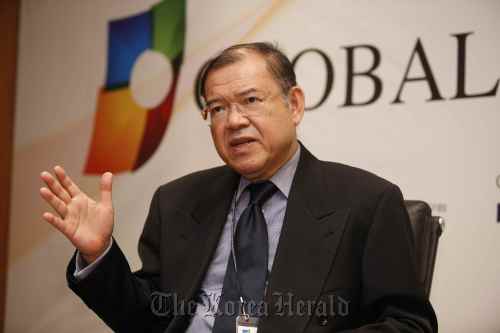[Herald Interview] Asia needs to reduce dollar use: UNCTAD chief
By 김주연Published : Feb. 28, 2011 - 18:22
Asian countries should increase use of their local currencies in inter-regional trade settlements to avoid currency disturbances stemming from U.S. monetary policies, Supachai Panitchpakdi, secretary-general of the U.N. Conference on Trade and Development, said.
“By creating more account settlement in, say Chinese renminbi, Indonesian rupiah, or the Korean won, the region could relax tension arising from trading in dollars,” he said in an interview with The Korea Herald.
The chief of the Geneva-based intergovernmental body visited Seoul to attend the Global Korea 2011 forum organized by the Korean government Thursday.
He said increasing bilateral swap arrangements and trade settlement accounts in Asian currencies would help the region become more independent of U.S. monetary policies.
The Thai national was referring to U.S. Federal Reserve’s $600 billion bond purchase since November which drove down the value of the dollar, hurt emerging economy exports and inflated asset bubbles.
Fast inflow of dollars into emerging markets in search of higher returns has been part of the force that prompted Thailand, Indonesia, Taiwan and Korea to impose fresh controls on foreign investment in the past three months.
As the surge in fund inflows raises the value of one currency against its major trading partners, emerging market countries from Brazil to Korea have adopted a range of capital controls, including a bond tax on foreigners and cap on currency forwards.
“Using less U.S. dollars is one way of reducing movement of liquidity disturbances,” he said.
“By creating more account settlement in, say Chinese renminbi, Indonesian rupiah, or the Korean won, the region could relax tension arising from trading in dollars,” he said in an interview with The Korea Herald.
The chief of the Geneva-based intergovernmental body visited Seoul to attend the Global Korea 2011 forum organized by the Korean government Thursday.
He said increasing bilateral swap arrangements and trade settlement accounts in Asian currencies would help the region become more independent of U.S. monetary policies.
The Thai national was referring to U.S. Federal Reserve’s $600 billion bond purchase since November which drove down the value of the dollar, hurt emerging economy exports and inflated asset bubbles.
Fast inflow of dollars into emerging markets in search of higher returns has been part of the force that prompted Thailand, Indonesia, Taiwan and Korea to impose fresh controls on foreign investment in the past three months.
As the surge in fund inflows raises the value of one currency against its major trading partners, emerging market countries from Brazil to Korea have adopted a range of capital controls, including a bond tax on foreigners and cap on currency forwards.
“Using less U.S. dollars is one way of reducing movement of liquidity disturbances,” he said.

“Because local currencies could be fixed in different ways, the participating countries would have less pressure for competitive currency devaluations.”
Commenting on the troubled savings banks of Korea, he said the financial regulator could have planned a more comprehensive, one-off program.
“It is usually much better to devise a bigger program that suspends troubled ones in one go, otherwise depositors will rush to take out their money,” he said.
The Financial Services Commission last month suspended seven savings banks suffering from its exposure to the weak construction projects.
Overall, savings banks held a total of 86.89 trillion won in assets at the end of 2010, which is roughly about half the assets held by Hana Financial Group, one of the four main commercial banks in the country.
He advised three major steps to take based on his experience as a central banker during Thailand’s banking crisis in the 1990s.
“First, the regulator should ask them to group together which would reduce management cost and competition in the industry. Second, the good ones should be made into fully pledged banks. And finally, a special fund should be planned for bail out to give assurances to the market,” he said.
Credit rating agency Moody’s said the distress among mutual savings banks will have a minimal impact on credit ratings of commercial banks in Korea.
“Despite the likelihood of more MSB failures due to asset quality problems, these events are not likely to pose a systemic threat to nor jeopardize the creditworthiness of Moody’s-rated Korean commercial banks due to four reasons, and in line with Moody’s previous opinion,” says Young-il Choi, a Vice President and Senior Analyst in Moody’s Financial Institution Group.
By Cynthia J. Kim (cynthiak@heraldcorp.com)







![[KH Explains] How should Korea adjust its trade defenses against Chinese EVs?](http://res.heraldm.com/phpwas/restmb_idxmake.php?idx=644&simg=/content/image/2024/04/15/20240415050562_0.jpg&u=20240415144419)










![[Today’s K-pop] Stray Kids to return soon: report](http://res.heraldm.com/phpwas/restmb_idxmake.php?idx=642&simg=/content/image/2024/04/16/20240416050713_0.jpg&u=)